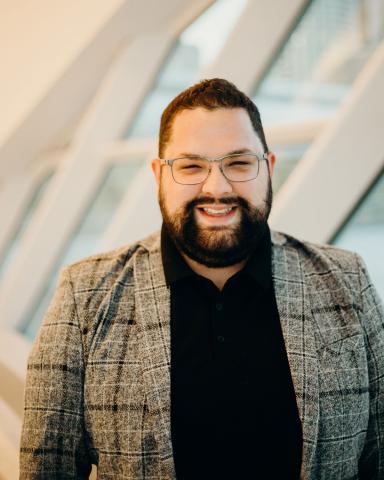Moody Graduate Student Spotlight: Nathaniel Repay
Published Fall 2022
Nathaniel Repay is a third-year PhD student in the Rhetoric, Language, and Political Communication area of the Communication Studies department (CMS). He did his undergraduate work at Drake University and Northern Illinois University, and his master’s degree is from the University of Wisconsin-Milwaukee.
His research focuses on issues of power and ethics in public culture, particularly within the context of mainstream Christianity in the United States. He has articles on short-term missionary work, contemporary Christian music, and megachurch mission statements under review at the moment, and is working toward a dissertation on megachurch culture and Christian nationalism.
Nathaniel Repay

Coming into the PhD my research had been sort of all over the place. I was focused on rhetorical studies but had not yet found my specific area of study. I knew the faculty here at Moody would be able to guide me in finding the research that makes me come alive, and that no matter what I ended up focusing on I would be working with some of the top scholars in my discipline. This has worked out so much better than I even anticipated; the faculty here have been the best mentors I could ask for.
Tell me about your teaching philosophy.
I am a firm believer in the idea that our research and teaching should go hand-in-hand, and so I draw my teaching philosophy from three core concepts in the field of rhetoric:
First is that rhetoric as a discipline belongs in the humanities. Cicero put it as the study of humans and “an education befitting a cultivated man.” I think understanding rhetoric as part of the humanities emphasizes that what we do is not just theoretical or abstract, but that it lives in and on people. So, I am committed to a focus on the humanness of my work, striving to place the humanity of my students at the forefront and see them as people first, and to teach concepts in a way that emphasizes our responsibility to each other.
Second, the field of rhetoric in the last half century has had a strong focus on the idea of “identification.” Rhetoric is concerned with understanding, cultivating, and critiquing the ways that people come to identify with one another. This manifests in the classroom culture that I strive to create where the goal is to strive for identification with each other, with the skills we teach, and with the people and ideas we wrestle with.
Finally, I study rhetoric in the context of communication. This means I’m concerned with how we create meaning within culture. That leads me to believe that in teaching we ought to be concerned with the discovery of meaning, not the ascribing of it. I aim for students to make discoveries both individually and collectively rather than to simply receive meaning from a lecture, textbook, or assignment. So, I see the classroom as a discursive and democratic space where the students are as much a part of the meaning-making process as I am.
Which course did you teach? Of which project/assignment/unit are you most proud? Why?
I have been a TA for several courses in the department and am an AI and now the Course Coordinator for CMS 306M – Professional Communication Skills, which is one of the introductory courses in our department. I’m proud of how we combine practical skills with learning core communication concepts in this class. We help put communication into a very real context for our students by teaching both key ideas in communication and developing presentation skills, both of which students will take forward throughout their college and professional careers.
What is your most memorable learning experience so far as a graduate student?
I came to Moody College in Fall of 2020, so my entire first year was online and I think the most memorable learning experience has been the process of coming back in person. The conversations that have happened in the last two years about what sort of things from pre-pandemic we need to keep and what changes that we made in response to the pandemic can help us grow now that we are coming out of it are so important to help us all grow and move forward. It is such a unique opportunity to reset and consider who we are and what we need as researchers, teachers, and students.
Where do you see yourself in 5 years?
I hope to continue teaching and doing research as a faculty member after I earn my PhD. I would love to be a basic-course director to continue teaching these kind of core classes for undergraduates, but I would also love to be in a position where I can advise and mentor graduate students in the future!

